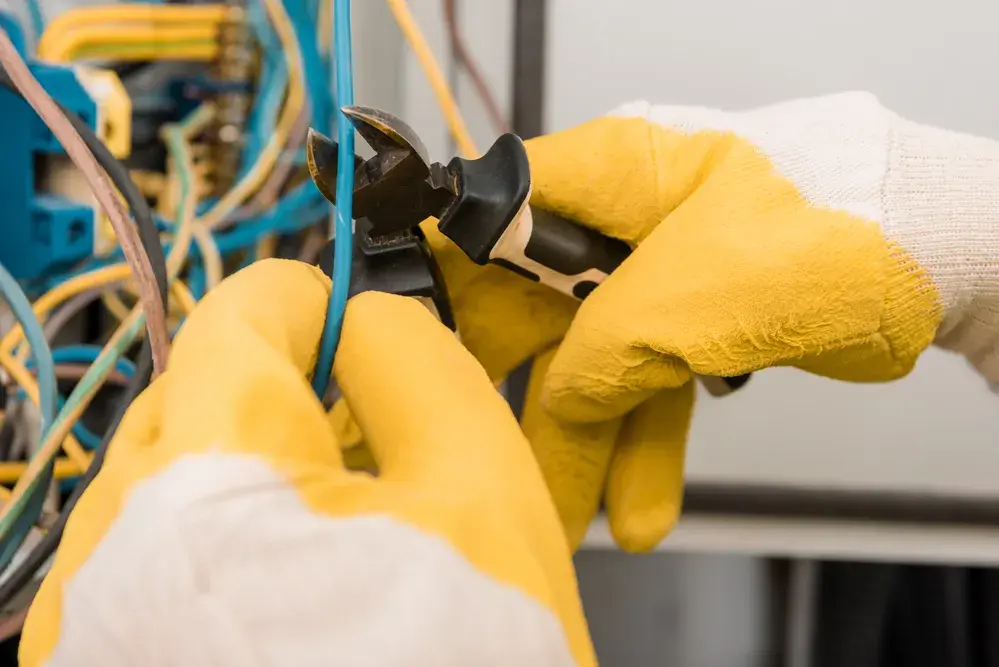Electrical Apprentice Salary: Everything You Need To Know
- ZenElectrical
- 9 Min Read
If you are reading this blog, chances are that you are thinking of kickstarting your career in the electrical field as an electrical. Or perhaps you are already working as an apprentice electrician and eager to know the scope of your earnings in this profession. In both cases, you have come to the right place!
Here, we will discuss the average apprentice electrician’s salary and how you can start your career with an apprenticeship in electrical systems.

Here What We Cover
Apprentice Electrician: Job Description And Requirements
When an individual starts training to become an electrician apprentice, their primary responsibility entails learning and observing all kinds of electrical work on the job site in the presence of a supervisor, like a master electrician. As an apprentice electrician, you are both a professional and a student who is learning the basic intricacies of electrical systems and assisting senior electricians with diagnosing and analyzing technical issues.
The roles and duties of an apprentice electrician include:
Repairing and installing electrical systems
Replacing electrical components such as wirings and switches
Analysing and determining electrical issues and malfunctions
installing channels between two electrical devices
Sourcing materials and components
To ace as an apprentice electrician, you need to have a solid background in theoretical and technical aspects. You will also need to fulfill some basic criteria, such as:
Minimum age to be 18 years old
A driving license
Pass a drug test (depending on location)
Apart from the above-mentioned requirements, prior technical knowledge is a must if you plan on getting trained as an electrician. In the next section, let’s look at apprentice electricians’ educational and training requirements.

Use our free estimate template now
Make winning quotes in minutes—for any industry and any job.
Education And Training Requirements For Apprentices
First and foremost, you must have a high school diploma or GED equivalent to be an apprentice electrician. Focusing on math, English, physics, chemistry, and other science subjects can be beneficial in the long run, as you might need your basics to be solid when preparing for electrician certification exams. You also need to be at least 18 years old to get into the next phase, which is an apprenticeship program.
Subsequent to that, you need to get into an apprenticeship training program, where you will be exposed to dedicated classroom hours along with hands-on field training. To be qualified to jump to the next level, which is a journeyman electrician, you must complete 8,000 hours of training and 800 hours of classroom sessions. If not an apprenticeship program, getting admitted to a trade school can serve as a suitable alternative. However, an apprenticeship program is more beneficial and a more suitable option as the cost is significantly less and provides real-life networking opportunities to get your hands on bigger and better projects once you complete your training.

Salary Range For Electrician Apprentice
As of July 2024, the average electrician salary for the apprentice level in the USA is $50k per year, with an hourly rate of $25. This is the mean average rate, as apprentices can earn more money depending on the number of extra projects or hours they dedicate.
Furthermore, these numbers can vary greatly depending on the location and region of their practice. According to ZipRecruiter, California, Washington, and New York are the top three states with a higher salary level for beginner-level electricians. Electricians practicing in these specific locations have a higher chance of earning more than the national average.
Once an apprentice electrician completes their required training and classroom hours, they are eligible to take their examination as a journeyman electrician. This can help them increase their scope of earning more revenue and boost their pay range to an average of $65,000 per hour with an average hourly rate of $33.
Factors Affecting Salary
There are various reasons why salary averages could differ from place to place.
It’s not just the location that matters; the experience and expertise of the electricians also play a significant role in deciding their pay rate.
For obvious reasons, a master electrician would earn more money per hour than an apprentice electrician. The master electrician has more expertise regarding electrical systems and the National Electric Code (NEC) than the apprentice electrician. More than the expertise, master electricians put down significant work hours previously to reach the highest certification level in this field, naturally making them the best person for any job, hence a higher pay range.
Moreover, apart from these factors, a licensed electrician is credited with better pay packages than an unlicensed practicing electrical worker with an associate’s degree. Also, according to research and survey results, an industrial electrician working on manufacturing projects or the construction industry earns significantly more than workers working on residential electrical systems.
Get posts like this in your inbox.
Keep learning how to run a 5-star business with our bi-weekly newsletter.
Career Outlook
According to Zippia, almost 625,388 apprentice electricians work in the United States, where the average salary is around $39,000 annually. With over 20,000 job openings for apprentice electricians currently in the US, over 50,000 more jobs are predicted in the coming decade.
In conclusion, apprentice electrician jobs are and will be in demand. The projected job growth rate from 2018-2028 is expected to be a solid 7%, with a visible 8% increase in salary in the last five years.
Job Advancement Opportunities
With additional training and expertise in the electrical field, an apprentice electrician can transition smoothly to the next level in the electrician domain, which is the journeyman electrician. Being a journeyman electrician requires hours of on-field training along with mandatory classroom hours.
You also need to take the journeyman electrician exam, which will help you get licensure to practice as a professional in the field. This requires preparing for the exam thoroughly—meticulously understanding vital topics, learning how to interpret blueprints, and gaining an in-depth knowledge of repairing and maintaining electrical systems.
Furthermore, electricians can choose their specialization after gaining substantial experience in the field and work towards it instead of being all-rounder electricians. Specializations in particular areas, such as industrial, residential, commercial, manufacturing, etc.
Last but not least, once you have achieved the highest level of certification in this particular domain—receiving the master electrician certification and licensure—you can start your own electrical contracting business. Starting your own business means doubling your earnings and being your own boss.

Conclusion
A career journey as an apprentice electrician is quite lucrative and rewarding. As one advances their skillset and broadens their expertise level with education and the other necessities in the career, one can pursue hands-on experience in this field.
The salary opportunities are ever-growing, and there is the possibility of obtaining higher stakes once you move from apprentice to journeyman and finally to master electrician.
The electrical industry is proliferating, and the demands for professionals are increasing daily. This line of work has a bright future for beginners just starting to learn the specifics and those who want to widen their competencies within this field.

Explore a better way to grow your business. Book a free demo now!
Get organized, win jobs, and wow customers.
Book A Free Demo with ZenTrades Today!
Related Reading
Why Your Field Software Management Software Needs QuickBooks Integration
ZenTrades Why Your Field Service Management Software Needs QuickBooks Integration Read More Request Demo...
Read MoreZenTrades How To Manage Electrical Service Agreements Like...
Read MoreZenTrades The Best 5 Jobber Alternatives In 2023...
Read More


